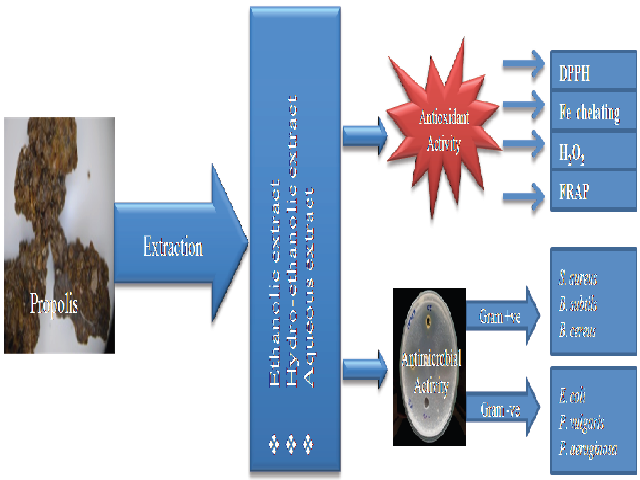In vitro antioxidant and antimicrobial activities of propolis from Kashmir Himalaya region
DOI:
https://doi.org/10.5530/fra.2016.1.6Keywords:
In vitro antioxidant potential, Kashmiri Propolis, Staphylococcus aureus, Total phenolics content, Total Flavonoids contentAbstract
Introduction: Propolis from Kashmir has not been explored as far as its phytochemistry and pharmacological activities are concerned. This piece of work is the first approach to explore it for various activities. Methods: Total phenolics, flavonoids contents and in vitro antioxidant assay such DPPH, H2O2 scavenging assay, ferrous metal ion chelating activity and total reduction capability assay were performed. Investigation for antimicrobial activity of different extracts (Ethanolic, hydro- ethanolic and aqueous) was also carried out. Results: The results showed highest total phenolics and flavonoids content in ethanolic extract (260 ± 10.00 mg GAE/g and 105 ± 5.00 mg QE/g respectively). All the extracts showed free radical scavenging potential but ethanolic extract exhibited significant scavenging potential having an IC50 value of 65.49 ± 7.01 μg/mL for DPPH, 74.94 ± 5.51 μg/mL for ferrous metal ion chelating activity and 109.93 ± 3.24 μg/mL for H2O2 scavenging assay. In total reduction capability assay ethanolic extract showed highest reducing power. In addition, ethanolic extract showed greater antibacterial activity against Staphylococcus aureus having zone of inhibition diameter 25.63 ± 0.63 mm. Conclusion: The presence of flavonoids in extracts maximum in ethanolic extract which could be responsible for antioxidant, antibacterial activities and can be used in the management of the human pathosis originated due to oxidative stress and in the treatment of microbial infections.
Downloads
Metrics





